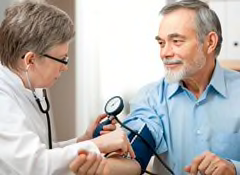Best Drugs to Treat High Blood Pressure - Consumer Reports (original) (raw)

Your heart is a powerful muscle that pumps blood through your arteries. To withstand that pressure, healthy arteries need to be flexible. Anything that makes them less so—getting older, certain medications, and risk factors such as inactivity, obesity, and smoking, or having a genetic predisposition, for example—can make blood pressure rise. Over time, that excessive pressure can damage blood vessels throughout the body, and increase a person's risk for heart attacks, strokes, and heart failure as well as kidney damage, vision loss, arterial blockages in the legs, and sexual impotency.
That's why it's important to detect high blood pressure early, so you can get proper treatment before the damage occurs. You should have your blood pressure checked at least once every two years, and more often if you're 50 or older or have other risk factors for hypertension. For most people, it's a good idea to have it done during every visit to a health-care provider.
If your initial reading is elevated, don't panic. A number of factors—including pain and emotional stress and even feeling nervous in the doctor's office—can temporarily boost blood pressure. To improve the accuracy:
- Don't smoke, exercise, or consume anything caffeinated for at least an hour before your appointment.
- Go to the bathroom first, since a full bladder can affect the reading.
- Sit with your feet flat on the floor for 5 minutes before the reading. Rest your arm on a table so it's at heart level. Remain quiet during the test.
If your blood pressure is high, your doctor may take another reading after about 5 minutes or so. If the reading is still elevated and you have no history of previous high readings, you should get another reading in a couple of weeks before initiating treatment. You can either come back to your doctor's office, or take your blood pressure at home following your doctor's recommendations. Good blood pressure equipment can be purchased at most drugs stores.
In fact, in such circumstances, your doctor may ask you to measure your blood pressure several times or even every day over a period of a week or so. He or she will calculate the average of all the measurements to get a final reading.
The reason to be sure your blood pressure is indeed elevated before starting on a medication is that the medicines used to treat it can have side effects. Plus, people with normal blood pressure should not take medicines because having excessively low blood pressure can be dangerous, increasing the risk for experiencing dizziness and putting some people at risk for accidents and falls.